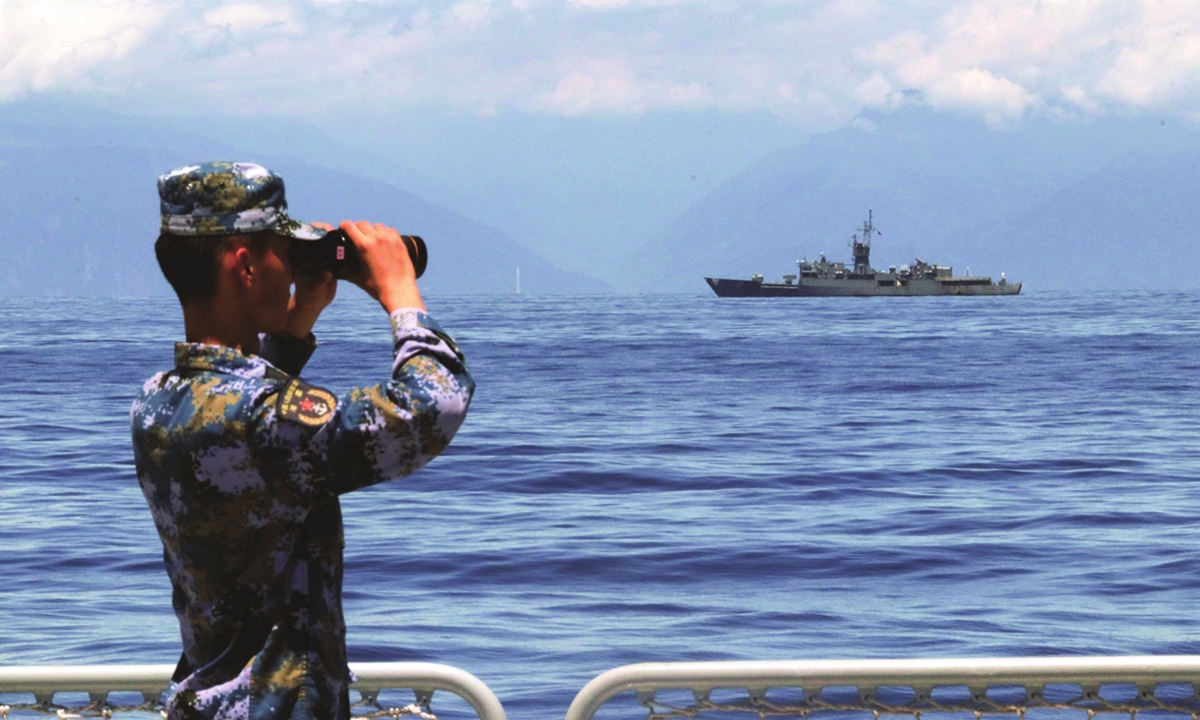
A soldier looks through binoculars during combat exercises and training of the navy of the Eastern Theater Command of the Chinese People’s Liberation Army (PLA) in the waters around the Taiwan island, August 5, 2022. Photo: Xinhua
The US, in consecutive provocative moves over the Taiwan question, has in the past few days approved another arms sale to the island of Taiwan and advanced its National Defense Authorization Act (NDAA) through Congress, which includes direct military loans and fast-track weapon sales.
Such sales would not change the total military advantage the Chinese mainland possesses, but experts underlined that the US’ continuous provocations, despite its president’s repeated promises not to support “Taiwan independence,” have laid bare the country’s poor credibility and ulterior intention of using the “Taiwan card” to stir up trouble for China’s development and reunification path.
The newly approved arms sales included spare aircraft parts to support Taiwan's fleet of F-16 fighters, C-130 transport planes and other US-supplied weapons systems, the Associated Press reported.
Song Zhongping, a Chinese military expert and TV commentator, told the Global Times on Thursday that the US has sold F-16 fighters and been updating F-16V fighters, which means there is a large demand for replacements and spare parts.
The Democratic Progressive Party (DPP) dreams of raising the budget to increase the attendance rate of the F-16 fighters, but the cross-Straits strength gap is impossible to be narrowed by the DPP no matter how much the DPP strives to arm itself, Song said. “Even if it spends a lot of money to update the F-16V, the fighters are of 4.5 generation and fall a generation behind those in the Chinese People’s Liberation Army (PLA).”
Mao Ning, a spokesperson of the Chinese Ministry of Foreign Affairs, urged the US to stop creating tensions across the Taiwan Straits, stop playing the “Taiwan card” to contain China and stop going further down the wrong and dangerous path, at Thursday’s routine press briefing.
In a statement released on Thursday in response to a question on the latest US arms sales to Taiwan island, Senior Colonel Tan Kefei, a spokesperson at China's Ministry of National Defense, said, “In recent years, while making stern promises to China on the Taiwan question, the US has emptied and undermined the one-China principle, continued to sell arms to the Taiwan authorities, pushed ‘legislations’ that brought negative impacts on the Taiwan Straits,” and sent senior officials to conduct activities in the island to further exacerbate tensions in the Taiwan Straits.
The US promise has been made but Washington contradicts what it says, and its contradictory practices fully expose its hypocrisy of saying one thing and doing another, which seriously damages the US’ political credibility and international reputation, Tan said.
“We urge the US to earnestly respect China's core interests and major concerns. If it repeatedly breaks its promise, acts recklessly, and connives and supports Taiwan secessionists, it will inevitably aggravate the tensions in the Taiwan Straits and eventually draw fire to burn itself,” Tan noted.
The Chinese People's Liberation Army will take all necessary measures to resolutely defend its national sovereignty and territorial integrity, and resolutely defeat any form of external interference and separatist plots for “Taiwan secessionism,” Tan said in the statement.
Observers also slammed the US’ consecutive provocations over China’s red line, only a few weeks after the top leaders of the two countries met in Bali, in what had been seen as an opportunity for easing bilateral relations.
US President Joe Biden reaffirmed that the US does not support "Taiwan independence" and has no intention of engaging in conflict with China, but what the US is doing goes against that assertion.
The South China Sea Strategic Situation Probing Initiative (SCSPI), a Beijing-based think tank, detected a US P-8A anti-marine aircraft flying over the Taiwan Straits on Thursday.
According to a US State Department notice obtained by Bloomberg, the Biden administration has proposed selling Taiwan island as many as 100 of its most advanced
Patriot air-defense missiles, as well as radar and support equipment in a deal valued at $882 million.
The NDAA, which is currently going through the US Congress, includes the Taiwan Enhanced Resilience Act (TERA), which would authorize $2 billion in annual military aid for five years, providing grants and loans to the island of Taiwan to purchase US military equipment, services and training, Reuters reported.
It also authorizes another $1 billion annually of emergency defense assistance to Taiwan island. A proposal that Taiwan be treated as a "major non-NATO ally" was removed from the bill.
Loans are not free aid, and the US is treating the island as a cash cow, trapping the DPP into debt while the burden is placed on all common people in Taiwan island, as the money could have been used to improve their livelihoods, Song said.
China should give the US a stern warning over its violation of promises and repeated provocations, experts said, adding that such US moves would only consolidate the Chinese mainland’s determination and morale for reunification.




